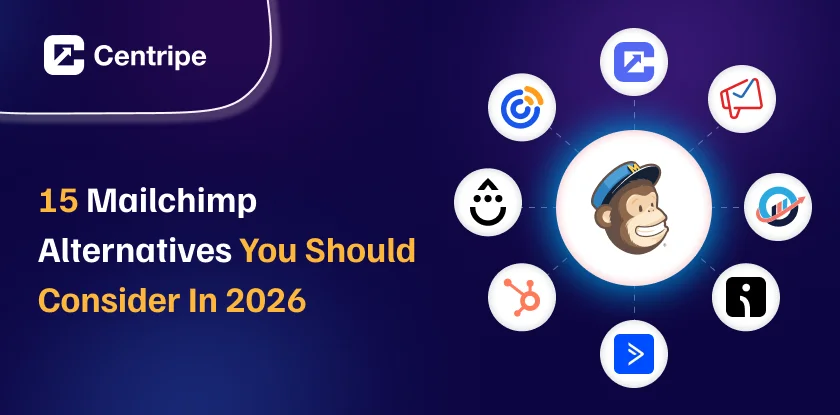Mailchimp is one of the most famous tools for email marketing. Many businesses use it, from small shops to big companies. But the truth is, Mailchimp is not perfect for everyone.
Some people find it too costly, others think it doesn’t give enough features in the cheaper plans, and many users want easier support when they get stuck.
That’s why a lot of businesses start looking for better options, tools that are cheaper, simpler, or come with extra features like CRM, SMS, or automation.
In this blog, we’ll walk you through 15 of the best Mailchimp alternatives. Each one has its own strengths, so you can pick the tool that fits your business needs the best.
Reasons why users are switching to Mailchimp alternatives?
Mailchimp has been around for a long time, and many people know its name. But just because something is popular doesn’t mean it is the best fit for everyone. A lot of users are moving away from Mailchimp, and here are the simple reasons why:
- It’s getting expensive
Many small businesses and solo workers feel Mailchimp costs too much. The free plan is very limited, and as your email list grows, the price jumps quickly. - Too few features in cheaper plans
On lower plans, you don’t get enough useful tools. Things like advanced automation or proper customer tracking are locked away in higher-priced plans. - Complicated to use for beginners
Some people say Mailchimp is not easy to understand. If you’re not very tech-savvy, setting up emails and automations can feel confusing. - Support isn’t very helpful
When users get stuck, they want fast, clear help. Many complain that Mailchimp support is slow or not available on cheaper plans, which can be frustrating. - Better all-in-one tools are available now
Other platforms now offer more than just email. They include SMS, WhatsApp, landing pages, customer management (CRM), and even reputation tools in one place. So instead of paying for multiple apps, businesses can save money and time by choosing these new tools. - Deliverability concerns
Some users feel their emails don’t always land in the inbox when using Mailchimp. That means their messages sometimes go to the spam folder, which hurts business.
Mailchimp Alternatives Every Business Should Consider
1. Centripe
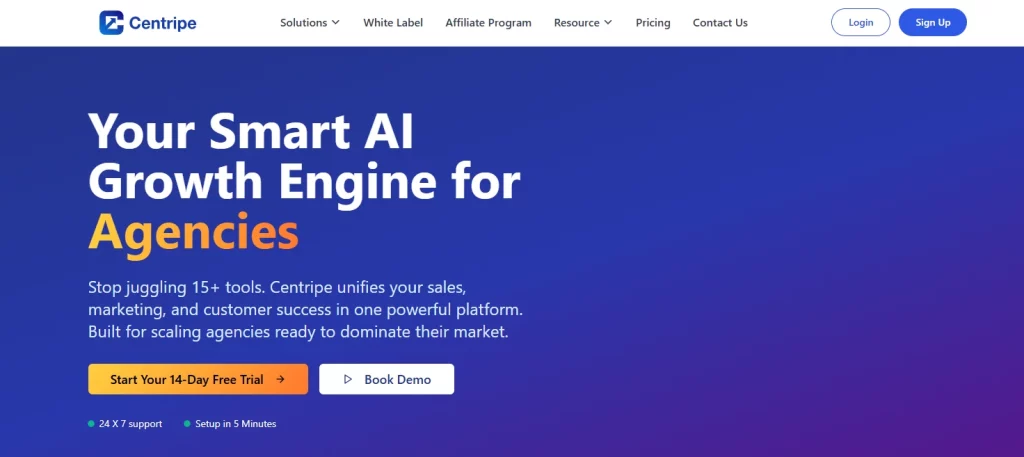
Centripe is more than just an email tool. It’s like having email, SMS, WhatsApp, chat, and a customer tracker (CRM) all in one place.
Instead of paying for 4–5 different apps, you can do everything inside Centripe.
What makes Centripe special is how simple it is. You don’t need to be a tech person.
You can send emails, reply to messages, follow up with leads, and even track reviews from one single dashboard.
For small businesses, it saves time and money. For agencies, it can even be resold under your brand name.
Key Features
- Built-in CRM that shows where your leads and deals are.
- SMS, WhatsApp, and website chat, all managed together.
- Smart automation (if customer does this → send that).
- Very high email inbox rate (97%), so your emails don’t end up in spam.
- Agencies can use it as their own tool with white-label.
- Ready-made email, form, and landing page builders.
- Online reputation tools to collect and manage customer reviews.
Pricing:
Essential: $99 per month
Unlimited: $299 per month
2. Brevo

Brevo is a low-cost and easy-to-use email marketing tool. It comes with all the main features you’d expect and can even replace Mailchimp for most people.
Setting it up is quick, managing contacts is simple, and the email designs look good on any device.
If you send a large number of emails and also want to run campaigns on different channels, Brevo is a solid choice compared to Mailchimp.
However, when money is not an issue, and you desire additional features (particularly in terms of online shops), then another system may be more appropriate to your needs.
Many small businesses consider Brevo one of the best email marketing platforms if you’re looking for affordability and solid deliverability.
Key Features
- A built-in CRM that works and keeps track of your deals.
- SMS, WhatsApp, and chat – all managed from one place.
- Smart automation with real “if this, then that” logic (not just simple step-by-step).
- 97% email deliverability rate – your emails reach the inbox.
- Transactional email API included – no need to buy add-ons.
Pricing:
The platform has a limited free plan for unlimited contacts and 300 emails per day.
Paid plans start at $9/month for 5,000 monthly emails (and 500 contacts) without a daily sending limit.
3. CRMOne
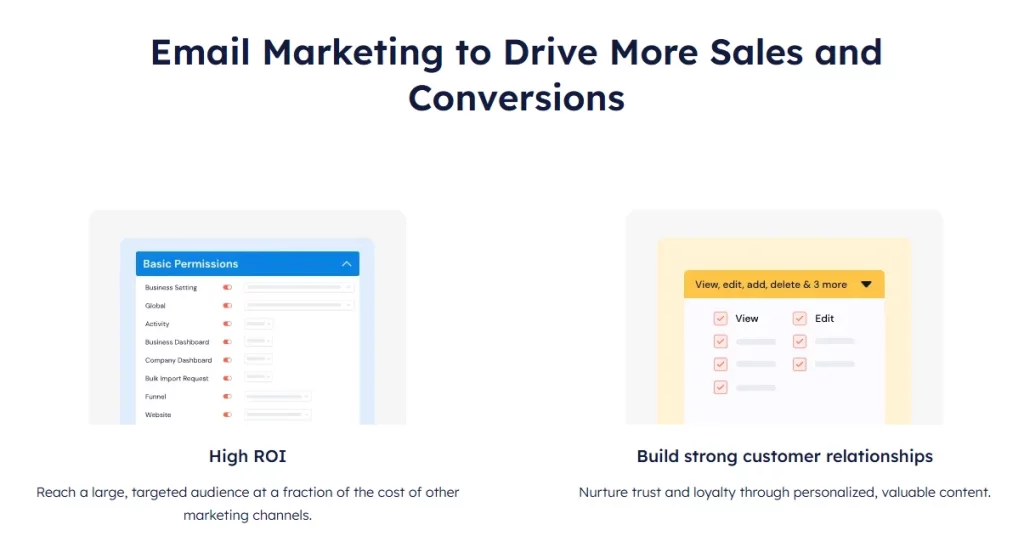
CRMOne is not just about sending emails; it’s like your full customer helper in one place.
Think of it as a simple tool where you can send emails, talk to customers, track sales, and even follow up automatically, without needing ten different apps.
What makes CRMOne different is how it connects email marketing with customer management (CRM). That means you don’t just send emails and forget, you can also see who opened them, who clicked, and how close they are to buying from you.
It’s built for small businesses, freelancers, and even bigger companies that want everything under one roof.
Key Features:
- Built-in CRM to track customers, deals, and sales in one place.
- Email, SMS, WhatsApp, and email automation tools together.
- Simple dashboards anyone can understand (no tech skills needed).
- Smart follow-ups – if a customer shows interest, the system reminds you or sends them another message automatically.
- Strong deliverability, so your emails reach inboxes, not spam.
- Easy templates for emails, forms, and landing pages.
Pricing:
- Launch: $18/month
- Grow: $32/month
- Scale: $56/month
4. Get Response
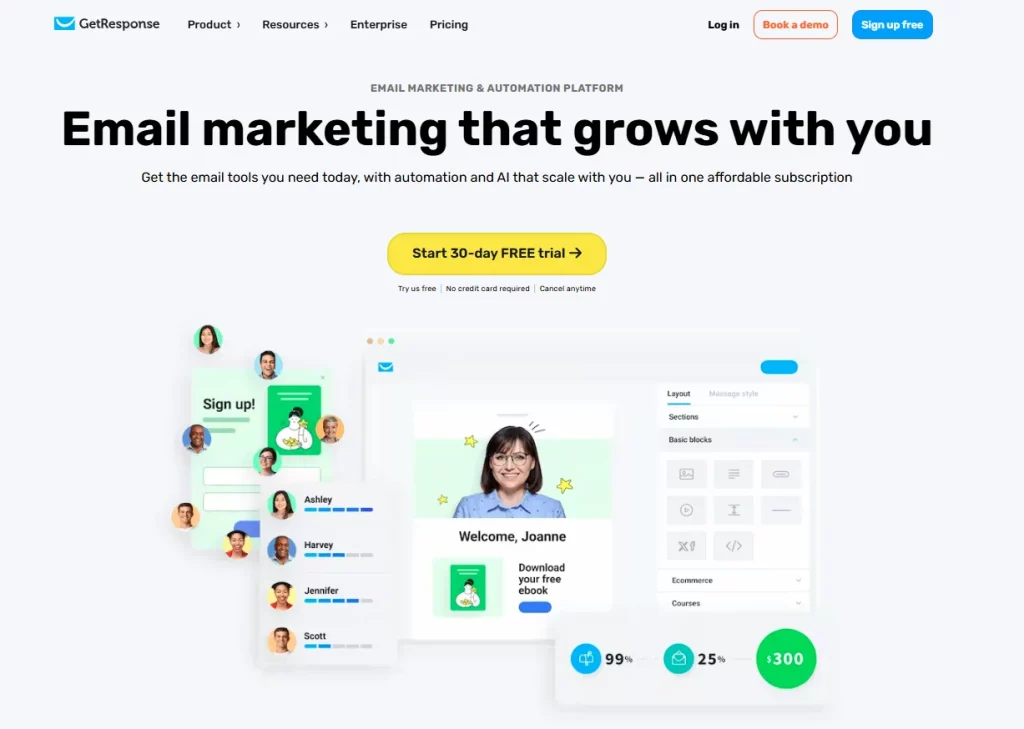
GetResponse is a marketing automation app that is specifically built to help small businesses and freelancers, coaches, and marketers handle all their email marketing tasks in one location.
It helps you increase your followers, build relationships with them, and also convert them into paying customers.
While most people know it for emails, GetResponse offers much more.
You can create online courses, build forms and popups, design landing pages, run automation, host webinars, send web push notifications, and plenty more, all in one place.
Key Features:
- A simple tool to create sales funnels step by step, shown in an easy visual way.
- You can host webinars for up to 500 people without any extra setup.
- An AI tool that writes emails for you – and it’s useful, not just a show-off feature.
- More than 200 landing page designs you can pick from, and they look good.
- Paid ads can be connected directly, in a way that’s easy to understand and manage.
Pricing:
- Starter: $15/month
- Marketer: $48/month
- Creator: $56/month
5. Klaviyo
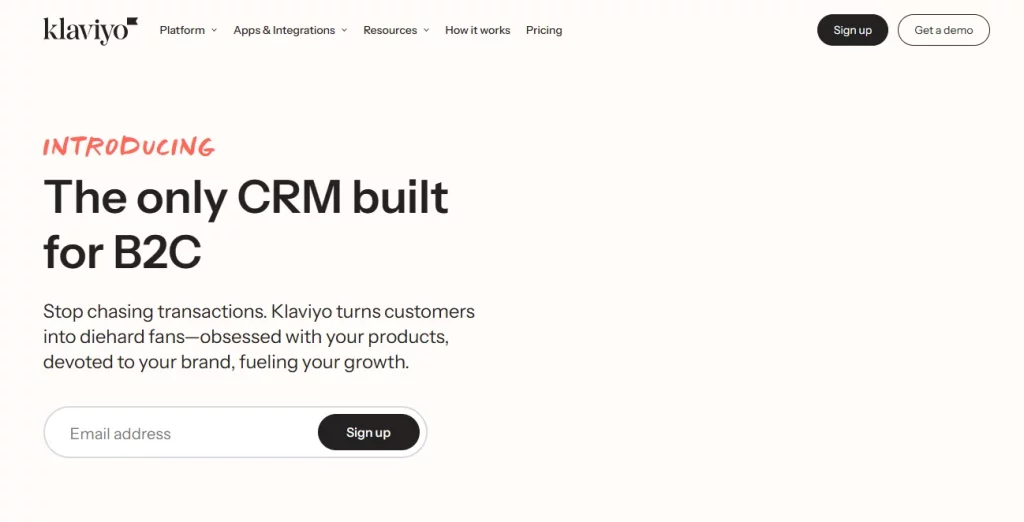
Klaviyo is an email marketing tool mainly built for online stores and works smoothly with Shopify. It’s a popular choice for retail businesses that want to connect better with their customers.
One of Klaviyo’s biggest strengths is its detailed analytics. If you like studying customer data and want clear insights, it’s one of the best Mailchimp alternatives available.
But there’s a catch: Klaviyo has become more expensive. From February 18, 2025, they started charging based on the number of active contacts in your list.
So, if you already have a big customer list but don’t need too many ecommerce features, it may be worth checking out other Mailchimp alternatives that fit your budget better.
Key Features:
- Ready-made setups for common things like abandoned carts, winning back old customers, and more.
- You can see how much money each email brings in, not just how many people opened it.
- Smart predictions show how long a customer might stay with you and warn if they may leave.
- SMS marketing is built in properly, not just added as an extra.
- Connects with 300+ other tools, and all of them work.
Pricing:
- Email: $45/month for 15000 contacts
- Email & SMS: $60/month (1500 emails + 1,250 SMS/MMS)
6. Hubspot
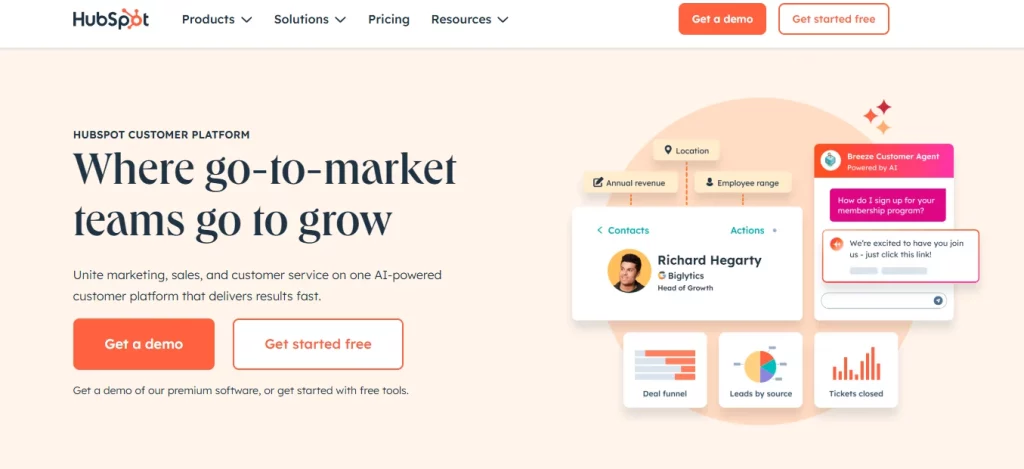
If you want more than just an email marketing tool, HubSpot is a strong alternative to Mailchimp. Along with emails, it comes with a full set of marketing and automation tools that help you create personalized experiences for your audience.
HubSpot is also one of the most powerful CRMs available. It’s a good option for businesses that want an all-in-one platform to manage marketing, sales, and customer relationships.
The only downside is the cost; HubSpot is quite expensive. For many small businesses, the price can be too high. And if you don’t need all the extra features, you can easily find other tools that do the job at a much lower price.
Key Features:
- An automation builder where you can actually see the flow clearly, step by step.
- A Creator Network that helps you cross-promote with others and grow faster.
- You can sell digital products directly inside your emails, no extra setup needed.
- A tagging system that is simple and easy to understand.
- Ready-made forms and landing pages designed to turn visitors into customers.
Pricing:
- Marketing Hub Professional: $852/month for 2000 marketing contacts
- Marketing Hub Enterprise: $3447/month (includes 10,000 marketing contacts)
7. Omnisend

Omnisend is another alternative to Mailchimp that’s built mainly for online stores. It’s simple to use and comes with tools for email marketing, SMS, and automation.
The platform is designed keeping ecommerce in mind and has capabilities that fit businesses such as home and goods, beauty, fashion, and other retail sectors.
Yet, Omnisend might not be the best solution that you should pick in case you want a more flexible tool to integrate outside the ecommerce sphere.
Key Features:
- Ready-made workflows that are practical and useful in real life.
- A product picker that makes creating emails super easy.
- Segment your audience based on their real shopping behavior.
- A campaign booster that automatically resends emails to people who didn’t open the first one (smart move).
- Fun “Wheel of Fortune” popups – they may look cheesy, but they work.
Pricing:
- Pro: $41.30/month for 2500 contacts
- Standard: $11.20/month for 500 contacts
8. Moosend
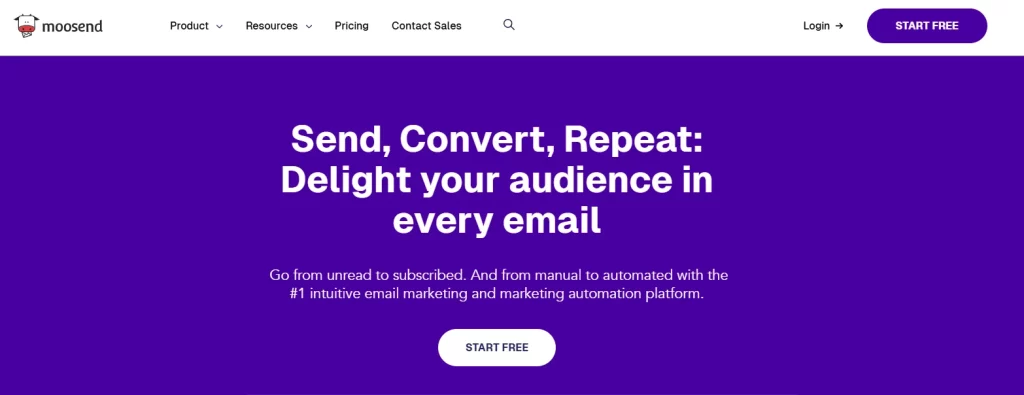
Moosend is a budget-friendly email marketing tool that also offers automation. It can be a good replacement for Mailchimp if you want to create and send email campaigns without spending too much.
It is quite economical for small businesses.
However, there are no elaborate A/B tests provided and no extensive connection with other apps, which can make Moosend seem a little narrow in terms of features.
Key Features:
- A drag-and-drop editor that works smoothly without slowing down.
Personalization that goes beyond just saying “Hi [Name]” – it feels truly customized. - A landing page builder is already included; no extra tools needed.
- Analytics that show results instantly, in real time.
- Smart e-commerce AI that suggests products customers are likely to buy.
Pricing:
- Pro: $7/month for 500 contacts (steal)
- Moosend Plus: Custom pricing
- Enterprise: Custom pricing
9. MailerLite
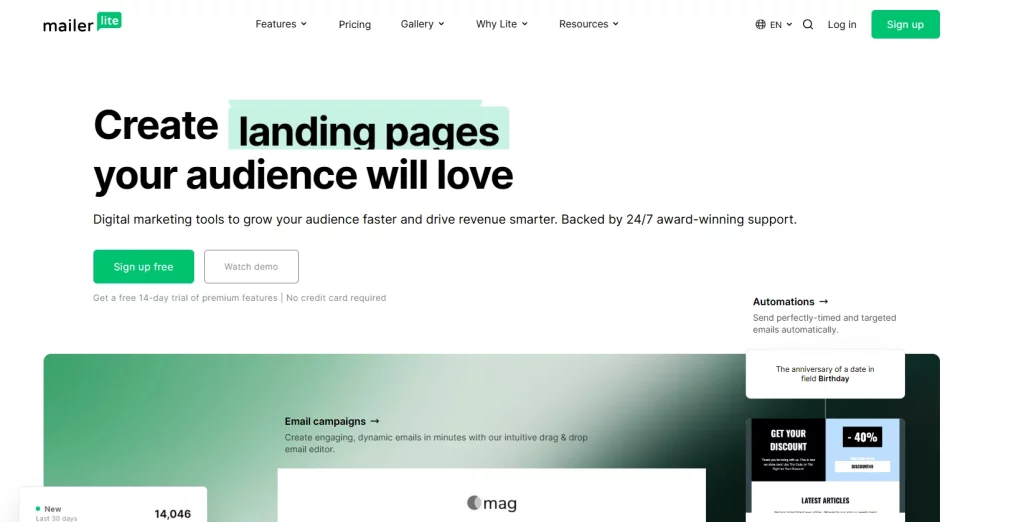
MailerLite is a low-cost alternative to Mailchimp and works well if you just need a simple email tool.
It’s easy to use, which makes it a good option for freelancers, solo business owners, and small startups.
Key Features:
- A drag-and-drop editor that is simple to use and works smoothly.
- An automation builder is available, even on the free plan.
- Landing pages and pop-ups are already included, no extra cost.
- You can sell digital products directly without needing another tool.
- An iPad app to manage your subscribers on the go (a bit random, but pretty cool).
Pricing:
- Free: $0 1,000 subscribers, 12,000 emails/month
- Growing Business: $9/month for unlimited emails
- Advanced: $18/month for unlimited emails
10. Constant Contact

Constant Contact is a tool that helps small businesses build websites, set up online stores, and send professional-looking email campaigns.
It’s a good choice for nonprofits and small businesses that want strong customer support and don’t really need very advanced automation.
Key Features:
- Event management tools that are simple and work without hassle.
- Social media integration that connects smoothly and works the way it should.
- Easy survey creation so you can collect feedback from people.
- Donation forms are designed to encourage more people to give.
- GDPR tools that are easy to use, no need to be a lawyer to understand them.
Pricing:
- Lite: $12/month for 500 contacts
- Standard: $35/month (get this for automation)
- Premium: $80/month for priority support
11. AWeber
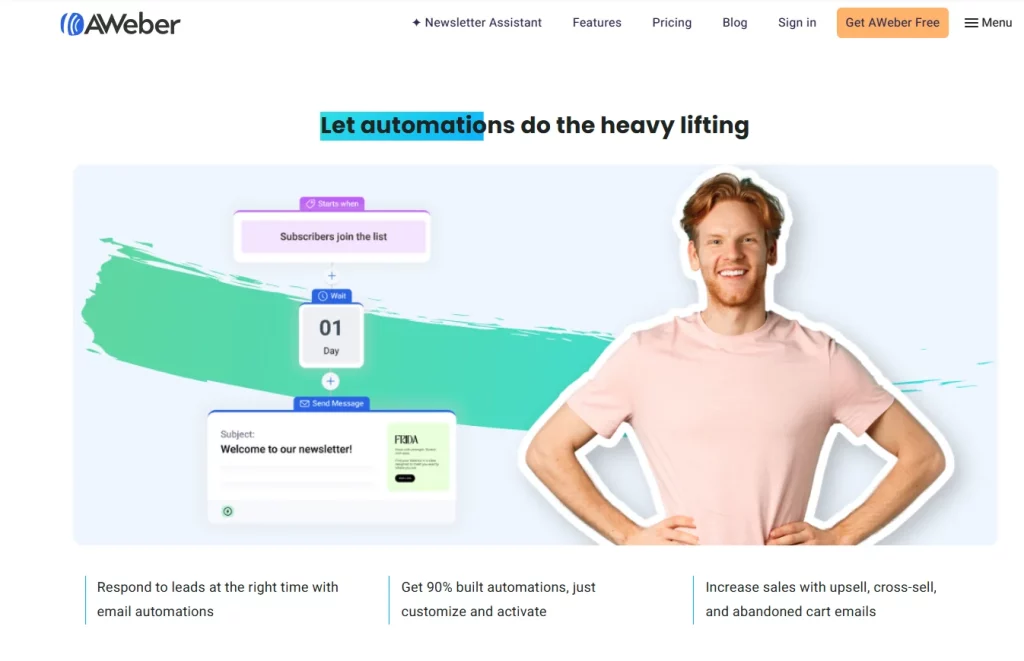
AWeber is another well-known alternative to Mailchimp. It is suitable for start-up businesses and individuals, and marketers aiming at expanding and accessing larger populations.
Key Features:
- AMP for interactive emails
- RSS-to-email that actually formats correctly
- Split testing is built in
- Tag-based management (finally)
- Canva integration for the design-challenged
Pricing:
- Free: 500 subscribers
- Lite: $12.50/month for 500 subscribers
- Plus: $20/month for landing pages
No Spam. No calls. Unsubscribe anytime.
12. SendGrid
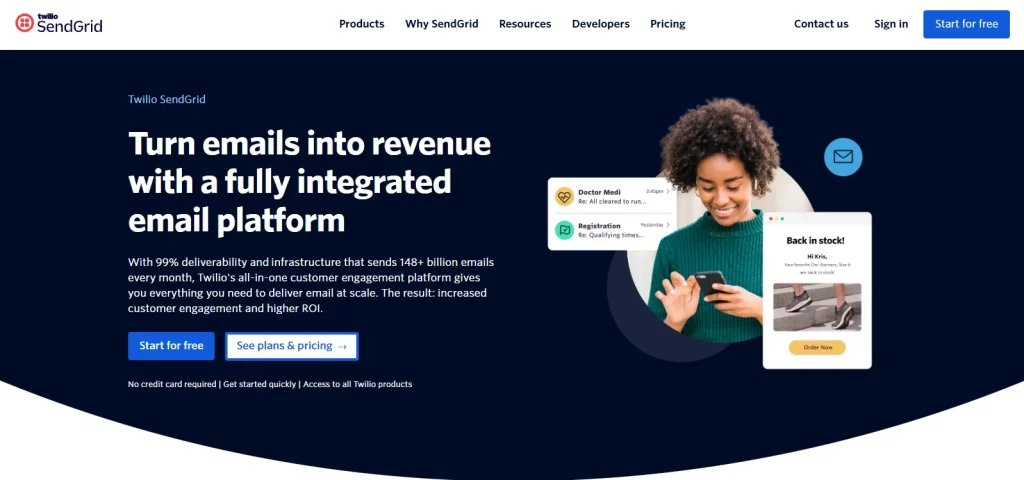
SendGrid is an email service built for businesses that need to send a huge number of emails, whether it’s marketing messages or important transactional emails like receipts and alerts.
It was bought by Twilio in 2019 and is trusted for its strong system that can handle big volumes of emails without issues.
SendGrid is known for being reliable and easy to scale as your business grows.
Key Features:
- An Email API that developers find easy to use and enjoy working with.
- A live analytics dashboard that shows results instantly.
- Built-in email checking to keep your contact lists clean and accurate.
- Option to get a dedicated IP address if you’re a serious sender.
- Webhook alerts for almost everything, so you always know what’s happening.
Pricing:
- Free: 100 emails/day
- Essentials: $19.95/month for 50,000 emails
- Pro: $89.95/month for dedicated IP
13. Campaign Monitor
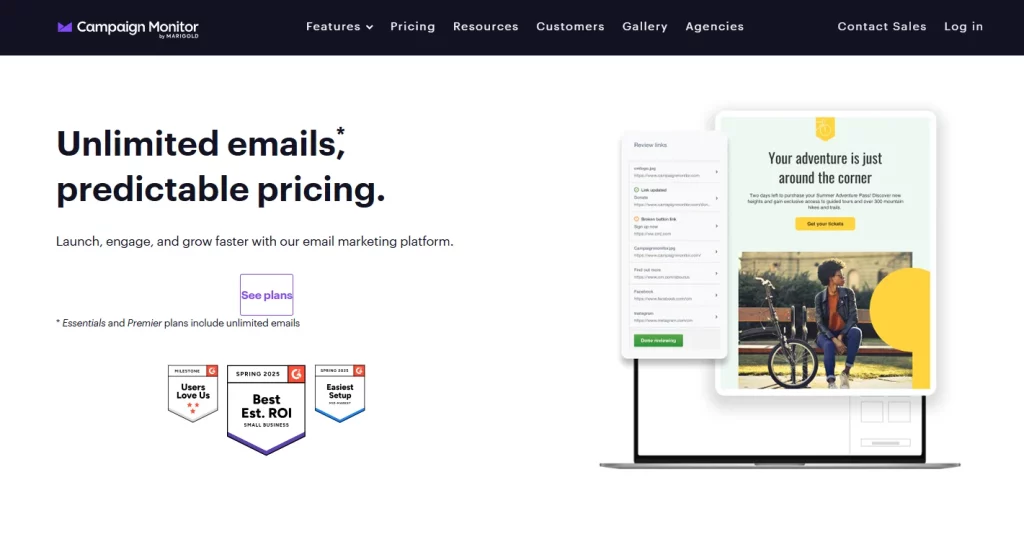
Campaign Monitor can be seen as an alternative to Mailchimp because it is a cheaper solution, especially when the business sending bulk emails is not that massive.
It also has extensive access to eye-catching email templates that you would use in things like announcements, holiday offers, or even reconnecting with past subscribers.
Key Features:
- Client management that is simple and easy to understand.
- A template builder that clients can use without messing things up.
- A journey designer where you can plan customer steps and even get approvals before sending.
- A transactional email API is already included, with no extra cost.
- A link checker that stops embarrassing mistakes by catching broken or wrong links.
Pricing:
- Basic: $10/month
- Essential: $26/month for unlimited sends
- Premier: $143/month for phone support
14. Drip
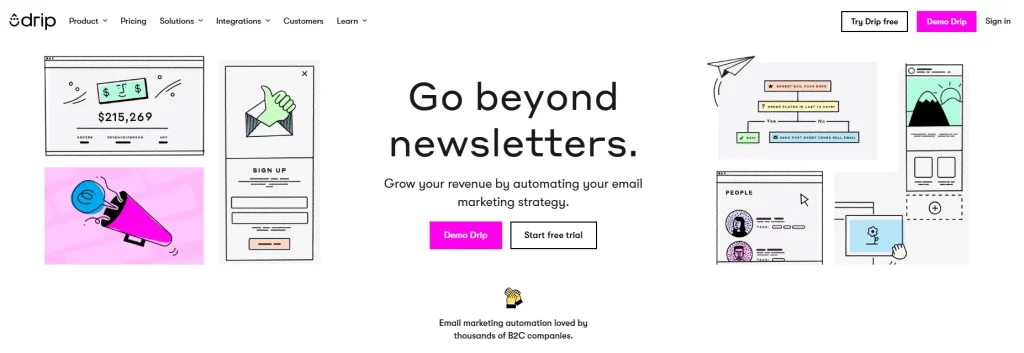
Drip is an email marketing tool made mainly for online stores. It helps ecommerce companies to get closer to clients and make more sales.
Drip has capabilities such as intelligent customer grouping and personalised automation, making it simple to use data to convey the correct message to the proper individuals.
This way, online shops can run targeted campaigns that bring in more revenue.
Key Features:
- See which emails actually bring in money, not just clicks.
- Run campaigns across different channels in a simple, clear way.
- Facebook Custom Audiences connect smoothly and work without issues.
- Customer groups update automatically based on their behavior.
- Cart abandonment flows are designed to bring lost shoppers back and turn them into buyers.
Pricing:
- Starts at $39/month for 2,500 contacts
- Scales with your list size
15. Flodesk
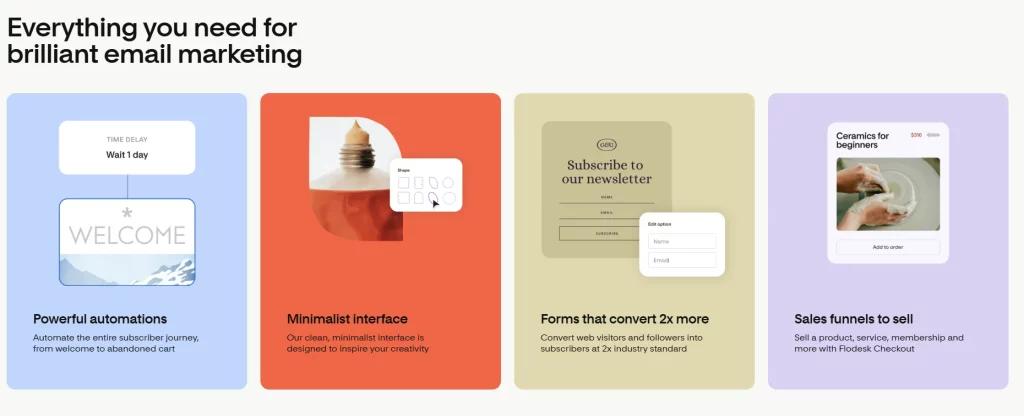
Flodesk is an email marketing tool made for small businesses that want to grow. It stands out because of its beautiful, ready-to-use templates and simple pricing.
Flodesk does not increase rates as your email subscriber list grows; rather, they charge a fixed monthly price.
It is therefore suitable for individuals seeking a simple, attractive, and scalable solution without worrying about the rising prices.
Key Features:
- Email templates that make designers jealous
- Simple workflow builder (emphasis on simple)
- Link actions for quick segmentation
- Basic but effective segmentation
- Sales pages included
Pricing:
- Professional: $35/month
- Advanced: $59/month
Conclusion
Mailchimp may have been the go-to email tool for years, but it’s clear there are plenty of powerful, easier, and even more affordable options out there.
Whether you’re a small business wanting something simple, an agency looking to white-label, or an online store needing smart automation, the right tool is waiting for you.
At the end of the day, your email marketing software should make life easier, not harder. So, pick the platform that fits your budget, matches your goals, and helps you grow without limits.
Because the best tool isn’t the most popular one, it’s the one that actually works for you.
